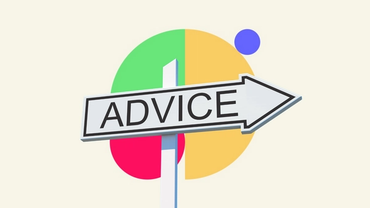Shortcut to: Finding a good financial adviser
Six steps to find an adviser you can trust
By Boring Money
3 Oct, 2024
Finding a good financial adviser can sometimes feel like searching for a needle in a haystack. In fact, Boring Money's Advice Report 2024: Choose Your Lane found that there are over 12 million people in the UK in the 'Advice Gap' and only around 9% of UK adults currently receive advice at all.[1]

If you're on the lookout for an adviser, there are thousands on the market, so it can be hard to know who's any good and who you can trust with your money. In this guide, we run through six steps to follow to find the right financial adviser to help you - whatever money matters you need help with.
1. Is financial advice right for you?
The first step to finding the right financial adviser is to ask yourself 'do you really need it'? Financial advice can be costly so it's well worth taking a step back and deciding if it's necessary in your situation or if free 'financial guidance' might be enough to help you out.
Financial guidance - often found for free online - is not regulated by the Financial Conduct Authority (FCA) but can be a useful source of information and give you a nudge in the right direction. Common examples of financial guidance include articles, guides, tips, lists and calculators which give you simplified help with your money.
Crucially, financial guidance is not tailored to your unique situation and so cannot give you personalised advice about what to do with your money. Any person or organisation that does this must be sufficiently registered with the FCA. You can read more about financial guidance, financial advice, and which one you might need in the article below.
It's also important to note that financial advice may not be suitable if you do not have a relatively large amount of money (or 'assets'). Many financial advisers will only work with people whose assets exceed a minimum threshold, so if you've got smaller amounts or you're below this threshold, you may be better off getting free financial guidance online from sites like Boring Money instead.
,If you’re considering traditional financial advice, you should really have at least £100,000 in investments or pensions – that’s the average minimum a financial adviser will work for and for many bigger wealth managers it’s actually nearer £200,000. An unsavoury truth is that it’s hard to find a financial adviser if you have less than this. It isn’t always the case, but people with smaller savings may struggle to find an adviser.
2. What do you need help with?
If you've decided that you need financial advice, the next step is knowing exactly what you need help with. There are many different types of financial adviser and they can specialise in different areas - for example, retirement planning, mortgages and insurance.
Therefore, the type of adviser you need can differ depending on what sort of advice you're looking for. A mortgage broker probably isn't the right fit if you're trying to sort out your pension!
Take the time to sit down and identify which specific areas of your finances you're trying to address before you start your adviser search - this will help you to narrow down from the get-go.
Your financial goals are one of the very first things any adviser will ask you about it, so it's a good idea to pin this down beforehand to save time and make sure you're both clear on exactly what you want.
Do you need a helping hand getting on the property ladder? Then search for a mortgage broker.
Are you looking for someone to help you plan out your retirement? Look for an adviser who specialises in pensions or retirement, such as a retirement planner or wealth manager.
Want advice on how to invest to meet your financial goals? Consider an investment adviser to help you lay good foundations for your future.
3. Be clear about what you want
Do you care about whether the advice firm you go to is restricted (can only offer limited options, a bit like an Audi dealership or a posh Lidl) or do you want an independent who can choose from the whole market?
On the plus side, restricted firms have centralised processes and investment committees and it’s not just what your individual adviser has selected – there are robust processes sitting under the bonnet. On the downside, you will not have options or investment choice, and some people feel uneasy about their adviser ‘pushing’ own range products. Clarity and transparency is vital here, so ask if they are independent or not and make sure you’re comfortable with the answer and the impact on how your money is managed.
If you have a clear preference on the above, it will filter your choices. If not, don’t worry as one is not necessarily better than the other, just different.
Do you prefer a big old brand such as St James's Place, Quilter, Brooks Macdonald, or Brewin Dolphin? The plus is you have a large, well-funded, well-governed firm behind your adviser which many find comforting. The negative is that you will be part of a bigger ship, so there will be less flexibility and you will be offered in-house products only.
4. Are they properly qualified?
Once you've made a decision and you're ready to start looking for financial advisers, you should check that anyone you're considering working with is regulated to give advice and properly qualified to do so.
In order to be fully qualified to give advice in the UK, a financial adviser must be registered with the Financial Conduct Authority (FCA) and have both of the following:
Level 4 or above of the national Qualifications and Credit Framework (QCF)
A Statement of Professional Standing (SPS) - This means they have completed their annual continuing professional development (CPD) in line with FCA requirements and have signed up to a code of ethics.*
*Advisers are required to renew their SPS annually so you should consider checking that theirs is sufficiently up to date. If in doubt about qualifications, don't be afraid to ask!
You can check if a financial adviser is registered with the FCA by searching their details on the FCA register. If you can't find them, this may mean that they're not regulated and therefore are not legally allowed to give you financial advice. Use the link below to search the FCA register.
5. What are the charges?
Now you've narrowed down your search and hopefully you've found a handful of advisers that appear to be suitable and qualified to help you. The next step is one of the most important considerations in finding a good adviser - how much will they cost? And perhaps more importantly, is it going to be worth it to you?
Financial advisers can charge fees for their service in a number of different ways and costs can vary widely. The four main ways that financial advisers charge include:
An hourly rate (typically between £150 - £250 per hour)
A set fee according to the work involved (e.g. £900 inc. VAT)
An annual or monthly retainer (typically 0.5% - 2.25% per year)
An ‘upfront’ or ‘initial fee, mostly a percentage of the money invested (e.g. 3% of your total assets)
So you can see, the cost of financial advice can range from as little as £150 an hour to well into the thousands of pounds, depending on the value of your assets.
Remember that the best adviser for you is not necessarily the cheapest. You need to determine if the service they offer is really going to help you and that you're going to get the best value for your money.
One adviser may be more expensive than another, but may be able to offer you a more extensive or thorough service that will benefit you more in the long run - therefore you may decide the longer-term benefits are worth the short-term cost.
A financial adviser should always be upfront about the charging model and the fees you can expect before you begin working with them. If they haven't specified, ask! It's far better to know what you're getting before you're signed into a contract than to get a nasty surprise later down the line.
Everyone has slightly different published charges and comparison online is almost impossible and it will certainly drive you mad. As a rule of thumb, expect to pay around 2 - 2.25% a year all-on for the big brands. More if you have complex needs such as one-off estate planning, for example.
Some smaller independent advisers who favour passive funds will have a cheaper ongoing fee – without the product or administration factored in, their ongoing advice fee is likely to be around 0.5 – 1% a year.
If you're discussing a fixed fee, about £150 - £250 an hour is the going rate.
Don’t be afraid to ask questions or to negotiate. And be clear about what sort of input and support you and your family would like on an ongoing basis. Some people are more complex than others.
For example, if you have pretty simple ISAs and pensions, you’re not approaching retirement, and you don’t do anything dramatic, then you will be cheaper to look after than something who is at the point of retirement and has a lot of complex accounts to manage.
6. Do you trust them?
And finally, by now - hopefully - you're in the final stages of selecting an adviser and you're weighing up the pros and cons of picking them over others on the market. One of the most important factors in finding a good financial adviser is trust.
In fact, according to Boring Money's Advice Report 2024: Choose Your Lane, 30% of UK investors and savers with more than £10,000 said that knowing 'who to trust' would be most helpful for them to make long term financial decisions.[2]
The matter of trust, ultimately, is a personal decision and no one can make that call for you. However, a good way of getting a sense of the trustworthiness of an adviser is to meet them first.
Fortunately many financial advisers will offer you a free initial consultation, where you can get to know them and discuss the parameters of the type and extent of advice you're in need of.
This is a great opportunity to find out if they relate to you, understand your goals and make you feel like you're in good hands. If you don’t click, trust your gut and try someone else.
Financial advice is rarely a cheap service, so avoid committing to someone you’re not happy with. We asked our Founder & CEO Holly Mackay for her top tips on finding a financial adviser you can trust with your money.
Recommendations are great. If your friends don’t have an adviser, then look online and check out any adviser’s reviews on Google or other sites. Read what they say on Twitter/X. Some advisers are clearly out there doing great work, they speak at industry events and they contribute to their communities. Others can be a bit snarky, and you may instinctively think ‘Not for me’. Or have a nosey at their LinkedIn. I think you can quite quickly get a feel for what they're like as a person. It’s a personal relationship so this is important. At the end of the day, I think it comes down to who you trust to look after your affairs. And who you have been able to have an honest dialogue with about fees. And who you think is worth the cost, for the peace of mind and financial; support they will offer. I think a decent adviser will ask you about your family, your goals, and your life, not just pull out a graph and talk at you about investment markets.
Questions to ask a financial adviser
So with all this in mind, once you're sat in front of a financial adviser, what should you be asking them? What are the key things you should make sure you're crystal clear on before you get started? And which questions should you pose to make sure you get the most out of your relationship with your adviser?
We asked the experts what they think are the most important questions to ask when you're getting settled with a new adviser.
Graham Wells from GroWiser Financial Coaching says the first step is all about understanding what you want. Matthew Spence from Spence Financial Ltd. says to pay special attention to the fees, while Tanya Laing from Gibson Laing Wealth Management says to make sure you get an understanding of how you will work together to better your finances.
1. First, what do you want to gain?
Graham Wells says the first and foremost question is actually for you to ask yourself: What is it that you want to achieve by seeking financial advice? Answering this can point you in the right direction from the off.
When searching for the ideal financial adviser, I’d recommend taking some time to consider what a successful outcome would look like first. Do you have a complex financial situation and/or significant amounts of capital to invest, with tax planning and investment management being a high priority?
If so, it’s worth asking prospective advisers about their qualifications, experience, investment philosophy and their approach to charging fees. Be on the lookout for “Chartered” level qualifications for this type of outcome.
On the other hand, if you need help navigating big future life events like retirement, a career change and generally trying to find a better balance between your time and your money, you’ll want an adviser that focuses on financial planning with lifetime cashflow modelling.
Certified Financial Planners are well placed for this type of support and it might also be worth asking if they have completed any training as a coach. It’s the deep listening and questioning skills that can really help you identify what you want from life, but also to challenge your own subconscious biases and limiting beliefs.
2. Are they restricted or independent?
Next, Matthew Spence says it's important to find out if your adviser is offering independent or restricted advice. Though this isn't necessarily a dealbreaker for everyone, there are some who may prefer to work with an independent adviser who can give them access to the full range of products on the market.
When choosing a financial adviser, it’s key to ask whether they operate under an independent or restricted model. This topic can be a bit controversial (within retail financial services), as there are valid arguments for both models.
In my view, all things being equal, Independent Financial Advice tends to lead to better outcomes for clients, while Restricted Financial Advice may be more advantageous for the firm.
3. How do the fees work?
Both Matthew and Tanya Laing say it's also crucial to be crystal clear on fees from the outset. What charging structure does your adviser operate by? Do you consider this to be good value for the service that you're seeking? Oh, and beware of "no initial fees" - this isn't always the full story!
There are various ways financial advisers can charge, and it is very important that they explain this to you clearly. They might charge an hourly rate, a fixed fee, or a percentage of your investment. It could be a one-off fee, or ongoing. Ask what exactly you get for your money - you might be surprised to find their service includes extras you did not initially think about such as future cash flow projections!
Be cautious of advisers who claim not to charge any initial fees. While this can occur, especially with large portfolios where ongoing fees may compensate for the upfront cost, it's not always fully disclosed.
I recently encountered a case where a client was told there were no initial fees, but the costs were hidden. If the client decided to leave the advising firm, the company would claw back any outstanding ongoing fees as a lump sum payment. A very big lump sum!
4. How will you work together?
And finally, Tanya says to ask your adviser how the two of you will work together to better your finances. How often will you meet? Will it be online or is there the option to discuss things face-to-face? This can help you to get a sense of how your relationship will play out over time.
What will your client/adviser relationship look like? Will you meet in person or virtually? How often can you contact them outside of scheduled meetings? How much help can they give you on other personal finance questions? It's important you have an open and easy relationship with your adviser; asking these questions will give you a good feel on how the relationship will develop over time.
Find an expert to help you
We hope you found this helpful in narrowing down your search for a good financial adviser. If you're just starting out, you could look at the financial advisers who kindly help our readers with tips and ideas. Or ask friends, family, or colleagues for recommendations, or hit up Google armed with the tips from this article to help you find the right fit.
---
[1] Boring Money, September 2024
[2] Boring Money, September 2024







